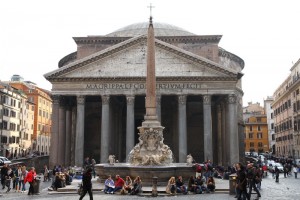
On Day Two we began our day by going to classes at the Vatican university. It took a while to find our room but a friendly priest who spoke really good English helped us find it. After our classes we went to lunch at the café at the university and then went to meet our tour guide Jill. Jill took us to see the Forums near the Coliseum where the Roman Senate was, the ground where Julius Caesar persuaded the citizens to like him, and various monuments to Roman victories.
We also saw some temples to the roman gods Jupiter and Venus, the most powerful gods in the Roman Pantheon. Throughout time the Romans did add more gods that they stole from the Greeks (but changed the names). The Romans would take the gods from areas they conquered and add them to their pantheon so the people just conquered didn’t have to change religions and this way the people accepted Roman rule better than empires that tried to change the local religion. The Romans also collected more money since the citizens of Rome left tributes to the gods – the more gods there are, the more tributes and taxes are given and used to build large projects like the Coliseum.
We also saw various arches in the forum showing Roman victories or important events that happened. An important arch is the one that depicts Constantinople’s vision of Christ and his eventual retaking of Rome. It also depicts Constantinople soon after moving the capital of the Roman Empire from Rome to Constantinople, where present day Istanbul is located. This greatly hurt the ego of Rome and the western half of the empire and damaged the economy, because all projects and buildings were focused around it being the capital and where the government is.
The eastern and western halves of the empire were completely different from each other and had a rivalry. They eventually became almost two separate countries. The people of Greece thought the West was barbaric and the East was wise and the West liked being barbaric and they thought the East sat around philosophizing too much and not doing more important things. This is similar to modern day relations with western and eastern countries except the conflict comes from the west being rich and democratic and the East being socialistic and under Soviet Rule.
